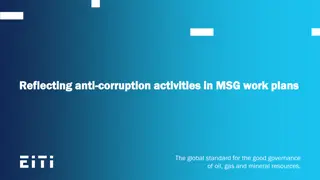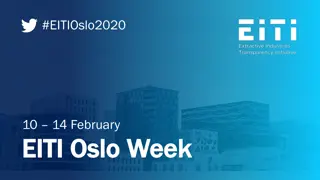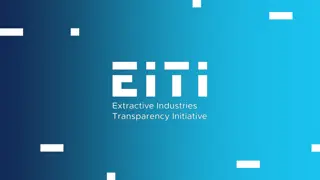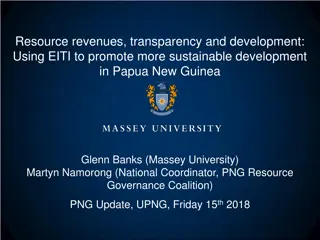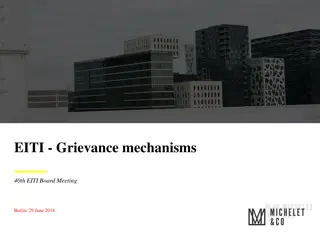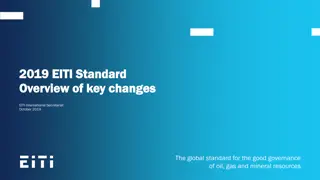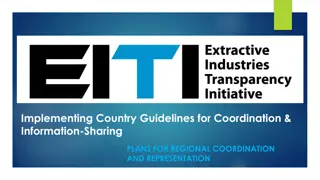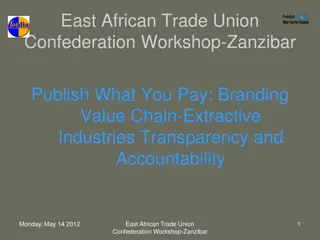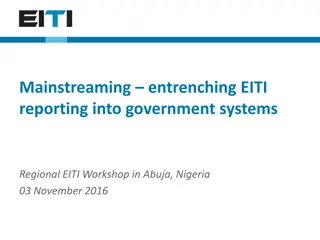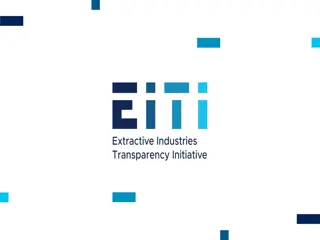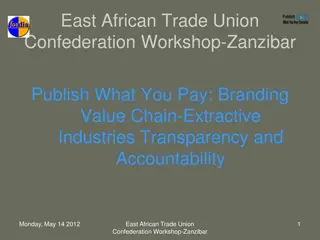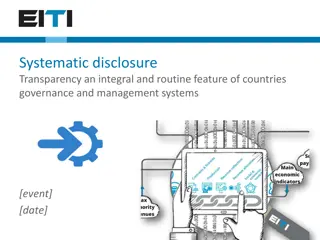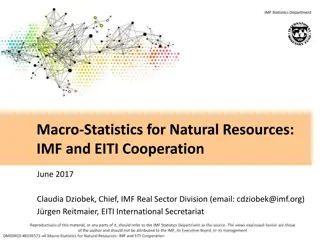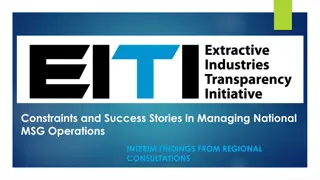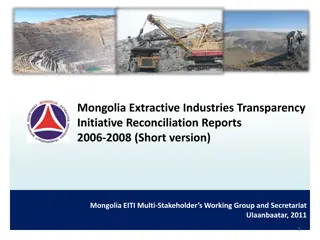Enhancing Anti-Corruption Activities in Extractive Sector Work Plans
Reflecting on anti-corruption activities in MSG work plans is crucial for good governance of oil, gas, and mineral resources. The EITI provides guidance on addressing corruption risks, with a recommended three-step approach: assess risks, develop an activity plan, and monitor results. Step 1 involve
0 views • 11 slides
Understanding Beneficial Ownership Requirements in EITI Standards
The EITI Standard requires countries to disclose the beneficial ownership information of oil, gas, and mining companies by January 2020. This includes details of the beneficial owner's identity, nationality, and any politically exposed status. Maintaining a public register of beneficial owners is re
0 views • 13 slides
Role of EITI in Addressing Corruption in Extractive Sectors
The Extractive Industries Transparency Initiative (EITI) plays a crucial role in combating corruption in the oil, gas, and mineral sectors globally. By exposing vulnerable practices, providing contextual information, supporting citizen engagement, and advancing anti-corruption norms, EITI helps dete
0 views • 9 slides
Utilizing EITI for Sustainable Development in Papua New Guinea
Discussing the importance of the Extractive Industries Transparency Initiative (EITI) in promoting sustainable development in Papua New Guinea by enhancing transparency and accountability in the extractives sector. The presentation covers the overview of EITI, challenges, understanding revenue flows
0 views • 12 slides
Enhancing Grievance Mechanisms in EITI: 40th Board Meeting Insights
Explore the presentation of existing grievance mechanisms at the 40th EITI Board Meeting in Berlin. Discussions centered around whether current procedures meet governance requirements and the potential establishment of new mechanisms. Findings highlighted the need for improved clarity, stakeholder u
0 views • 6 slides
Evolution of the 2019 EITI Standard and Key Changes Overview
The 2019 EITI Standard has undergone significant changes to reflect stakeholder feedback, address ambiguities, and improve implementation practices. These changes aim to provide more clarity, flexibility, and encourage countries to enhance disclosures in key areas. Key changes include updates in ter
0 views • 9 slides
Enhancing Coordination and Information-Sharing in EITI Implementing Countries
Strengthening communication lines and collaboration within EITI implementing countries to improve coordination, information-sharing, and representation at the EITI Board. The guidelines emphasize transparency, mutual accountability, inclusion, and results orientation. Ground rules promote convergenc
0 views • 11 slides
Championing Transparency and Accountability in Extractive Industries Across Africa
Explore the resource wealth of Africa, highlighting the challenges and opportunities in the extractive industries sector. Discuss the essence of Publish What You Pay (PWYP) and the Extractive Industries Transparency Initiative (EITI). Delve into the status of various African countries in oil, gold,
0 views • 54 slides
Enhancing Transparency through EITI Mainstreaming in Government Systems
Promoting transparency in government systems is crucial for effective governance. The process of mainstreaming and entrenching EITI reporting can enhance transparency and accountability, as demonstrated by case studies from Timor-Leste. By incorporating transparency as an integral part of governance
0 views • 16 slides
Understanding Beneficial Ownership in Oil, Gas, and Mineral Resources Governance
Beneficial Ownership (BO) is a crucial aspect of governance in the oil, gas, and mineral sectors. Requirement 2.5 of the global standards mandates disclosure of the natural person(s) who directly or indirectly ultimately own or control a corporate entity. Elements of BO include natural persons, owne
0 views • 22 slides
Extractive Industries Transparency and Accountability Workshop in Zanzibar
The workshop organized by the East African Trade Union Confederation addressed the challenges and opportunities in the extractive industries sector in Africa, focusing on the essence of Publish What You Pay (PWYP) and the Extractive Industries Transparency Initiative (EITI). It discussed the resourc
0 views • 54 slides
Enhancing Governance through Systematic Disclosure and Transparency
Systematic disclosure and transparency play a crucial role in the governance and management systems of countries. This involves routine disclosure of information, such as financial data, to promote accountability and address gaps in information. The EITI Standard emphasizes the importance of mainstr
0 views • 23 slides
IMF Statistics Department - Natural Resources Statistical Tools
IMF Statistics Department has developed two statistical tools, the Revenue Template and National Accounts Template, to help countries analyze government revenues and natural resources in national accounts. These tools are crucial for policymaking in countries heavily reliant on natural resource reve
0 views • 9 slides
Challenges and Successes in Managing National MSG Operations
Interim findings from regional consultations highlight key constraints and success stories in managing Multi-Stakeholder Group (MSG) operations for EITI implementation. Challenges include meaningful engagement, governance structures, and membership dynamics, while successes stem from effective multi
0 views • 12 slides
Overview of Mongolia EITI Reconciliation Reports 2006-2008
Mongolia's Extractive Industries Transparency Initiative (EITI) reconciliation reports from 2006 to 2008 show an increase in the number of reporting companies and a decrease in discrepancies. The reports reveal transparency levels in state budget allocation, taxes, and payments from reconciled compa
0 views • 19 slides
